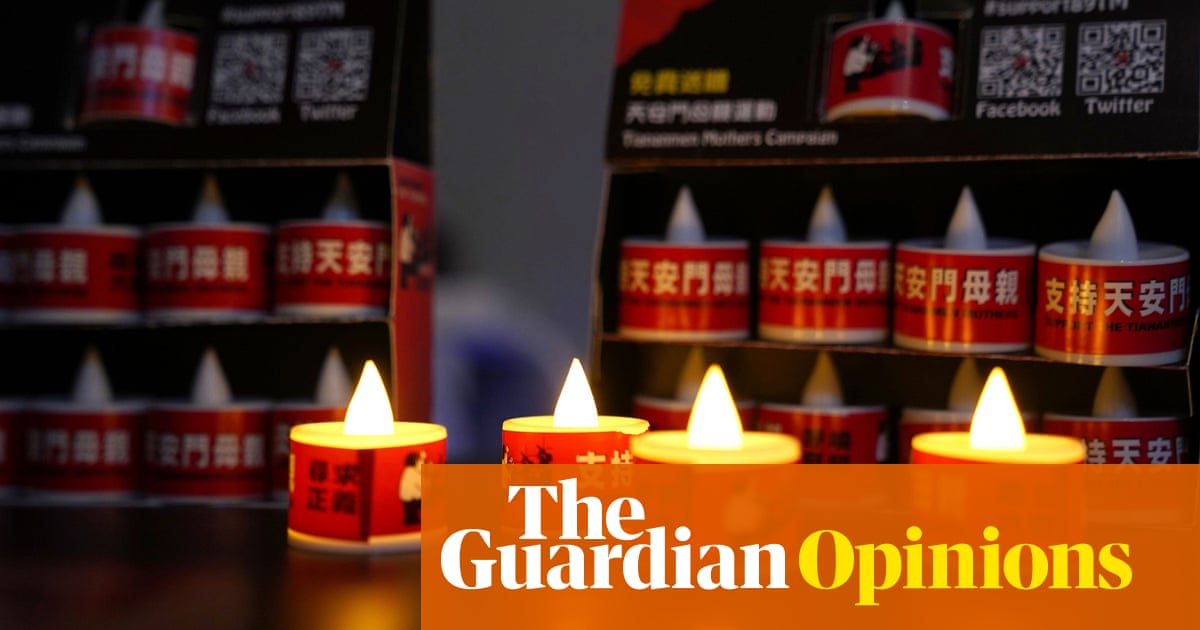The Guardian view on remembering Tiananmen 1989: mourning for those who cannot
Show caption Candles are lit at the June 4th Museum in Hong Kong, which commemorates the 1989 Tiananmen Square massacre. Photograph: Lam Yik/Reuters Opinion The Guardian view on remembering Tiananmen 1989: mourning for those who cannot Editorial Beijing’s attempts to obliterate the memory of the massacre are extending their reach
Wed 2 Jun 2021 18.25 BST Share on Facebook
Share on Twitter
Share via Email
When forgetting is compulsory, remembering can be a lonely business. Zhang Xianling’s 19-year-old son was shot in the head as Chinese troops bloodily suppressed the student-led protests that began in Tiananmen Square, Beijing, in 1989. In the 32 years since, she and other Tiananmen Mothers have campaigned in vain for an honest reckoning of the events of 4 June, while the Communist party’s imposed amnesia has made the subject utterly taboo on the mainland.
“So there is hope after all!” she exclaimed, when the scale and passion of Hong Kong’s annual vigil was described to her a few years ago. The event, attended by up to 180,000 at its peak, was the largest in the world and kept the memory of the killings alive on Chinese soil. But it will not happen this Friday, and perhaps it will never happen again. The authorities have banned it for a second year running, purportedly due to coronavirus concerns – though other mass events continue, and authorities have warned that anyone who tries to participate could face five years in jail. Macau has acted similarly.
Last year, thousands in Hong Kong defied the ban and gathered anyway. But 24 pro-democracy figures were subsequently charged with participating in an unauthorised assembly or inciting others to do so; Joshua Wong, already jailed, was sentenced to an additional 10 months after pleading guilty to involvement. On Sunday, the 65-year-old activist known as “Grandma Wong” was arrested on unauthorised assembly charges – for a solo demonstration that day to mark the massacre. A museum commemorating the events was forced to shut three days after opening, pending investigation. Plenty in the city plan to light a candle in memory of the dead. But without the public space for discussion and collective remembrance, the amnesia spreads.
The Communist party’s erasure of 1989’s killings has been so comprehensive and effective that many young people on the mainland are unaware they happened, and others have come to believe that perhaps the crackdown was necessary. The silence grows. The right to remember what happened in 1989 is also the right to know the truth more broadly: “Defending the memory of Tiananmen is the first line of defence,” one Hong Kong lawyer said this week.
What we should recall, however, is not only the slaughter 32 years ago, but the huge support for the protests which preceded it. There were marches in more than 300 cities; officials including police and judges participated in demonstrations calling for freedom and reform. Many of the hundreds, possibly thousands, who died in Beijing and elsewhere were not students, but ordinary residents attempting to protect them. To remember 1989 is to remember that there is an alternative, however impossible it might seem now: that Hong Kong could have kept its freedoms; that octogenarians could be allowed to mourn their slain children without harassment; that Uyghurs could live in dignity in Xinjiang; that human rights could be protected in China and its people trusted with the truth and the freedom to debate them.
Though their numbers inevitably dwindle as the years pass, the Tiananmen Mothers persist in their brave and lonely campaign. When their supporters on the mainland and in Hong Kong are silenced, it is up to the outside world to keep the flame burning, telling them that there is still hope.
This article was amended on 3 June 2021. The Tiananmen protests were crushed 32 years ago, not 31. This week’s (now banned) Hong Kong memorial vigil was set for Friday 4 June, rather than Thursday.













